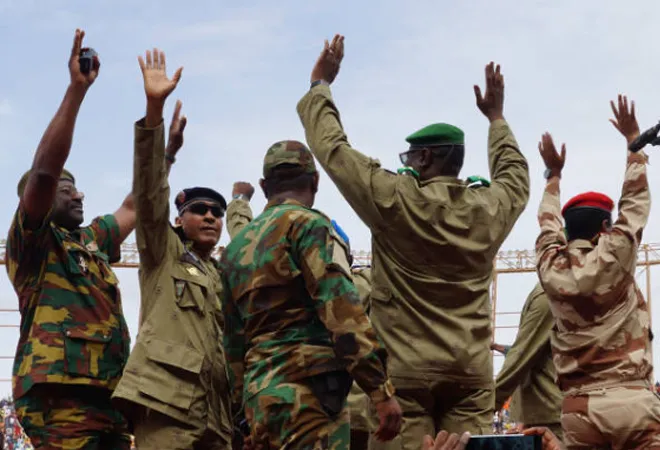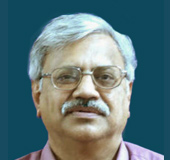
The military coup in Niger on 26
July 2023, which ousted the democratically elected regime of President
Mohamed Bauzoum, offered yet another example of how Niger as well as the entire West African region is prone to political instability and military coups. Niger’s
head of the Presidential guard, namely, General
Abourahmane Tchiani, has already taken over the reins of power after the coup.
The current political imbroglio in Niger can be placed in perspective by taking into account certain specificities of Niger, in particular, and the West African region, in general.
In a bid to restore constitutional order in Niger, a
delegation of the Economic Community of West African States (ECOWAS), joined by the UN Special Representatives from West Africa and Sahel, has already met the two contending parties to resolve the matter diplomatically. In spite of diverse international pressures, the military rulers are stubbornly holding on to their position. The Putschists are demanding at least three years to restore a civilian regime. In the meanwhile, the ECOWAS has explored all the options from direct military intervention by force, and slapping of trade and economic sanctions to resolution of the issue through diplomacy to reinstate the Bauzoum regime. They have also suspended
financial and economic transactions with Niger. If the ECOWAS chooses to intervene militarily, Burkina Faso and Mali have warned that it would be tantamount to
declaring war, which will have disastrous consequences for the entire region. Incidentally, both Burkina Faso and Mali are under military rule. Moreover, the European Union (EU) also announced suspension of
security-related funding to Niger. The current political imbroglio in Niger can be placed in perspective by taking into account certain specificities of Niger, in particular, and the West African region, in general.
Specificities of Niger and West Africa
Since its political independence in 1960, Niger has witnessed
four military coups in 1974, 1996, 1999 and 2010, respectively. Likewise, since 2020, the politically volatile region of West Africa has witnessed coup attempts in Niger (2021) and in Guinea Bissau (2022), and successful coups in countries such as Mali (2020 and 2021) Guinea (2021), Chad (2021), Burkina Faso (2022) and Niger (2023). Interestingly, among France’s former African colonies, the military junta has captured power in
Guinea, Mali, Burkina Faso, Chad and Niger. In fact, since the 1990s,
78 percent of the 27 coups in Africa took place in Francophone Africa. France found it relatively easier to control its former colonies through the military rulers.
The African Union (AU) and the ECOWAS, along with external powers and forces such as the United States (US) and France as also the EU have been participating actively in the politics of the entire region with the aim of promoting democracy and combatting terrorism.
Multiple factors such as the rich mineral wealth of the region, involving key minerals like uranium, gold, coal, and gypsum found in
Niger; gold, zinc, phosphate, limestone, copper, and manganese found in
Burkina Faso; and uranium, diamonds , copper, vanadium, and nickel found in
Mali, coupled with acute poverty and the proliferation of diverse militant Islamic outfits have cumulatively shaped the political economy of Niger and the West African region as a whole. Furthermore, the African Union (AU) and the ECOWAS, along with external powers and forces such as the United States (US) and France as also the EU have been participating actively in the politics of the entire region with the aim of promoting democracy and combatting terrorism.
Democracy and social realities in Niger
In Niger, Mohammadu Issofou, a staunch ally of the West, had ruled two successive terms (2011-2021). It was the first time that the transfer of power in Niger, after the 2021 elections, was peaceful and democratic, which led to the rise of President Bauzoum. Although Niger was slowly becoming a hope of democratic forces in the region, the ghost of a military coup did not cease to haunt it altogether.
Mohammadu Issofou belongs to the Hausa ethnic group and he had, like his predecessors, appointed military personnel on ethnic lines, which consolidated his power.
Like several other African countries, Niger’s polity is fractious in the sense that it is divided into diverse ethnic groups, where the dominant group of the Hausa constitutes 56 percent of the population, while the Zarma-Songhay together are 22 percent, and Tuareg are 8 percent, apart from many other small social groups. Mohammadu Issofou belongs to the
Hausa ethnic group and he had, like his predecessors, appointed military personnel on ethnic lines, which consolidated his power. In contrast to Issofou, Bauzoum belongs to a minority population with an ethnic
Arab origin. He was often treated as a foreigner by the people. It was not easy for a leader from a minority group to handle a predominantly Hausa nation. Besides, socio-economic conditions have been dismal in Niger. Niger’s agrarian economy is not well diversified. It has been in shambles because more than
ten million people or almost forty percent of the population lives in acute poverty in Niger’s vast geographical space.
Geopolitical location and quest for security
Geopolitically, Niger is located between the Sahara and the Sub Saharan regions. It shares borders with Nigeria and Benin to the south, Burkina Faso and Mali to the west, Chad to the east and Algeria and Libya to the north. Niger and its surrounding countries are plagued by the terrorist activities of varied radical Islamic outfits. Such outfits, in their turn, are linked to transnational terrorist organisations such as the Al Qaeda and the Islamic State (IS). Among the regional terrorist outfits, the Boko Haram has been particularly active in
Nigeria, Niger, Chad, Cameroon and Mali. Niger was among the
G5 Sahel countries including Mali, Chad, Mauritania and Burkina Faso that provided an institutional framework for a multinational task force to ensure security and combat terrorism in the entire region. Moreover, French troops were also participating in this since 2013, through
“Operation Burkhane” in Mali to fight terrorism before that operation ended in
France’s failure in 2022. Despite concerted efforts to fight terrorism on the part of regional and global powers such as France and the US, the radical Islamist outfits are thriving in the region. In the process, Niger has also been burdened with
245,467 refugees from Nigeria and Mali and around
350,000 displaced persons from the region. However, owing to its location, a large number of people are migrating to EU countries via Niger. Evidently, the military regime in Niger has leverage to negotiate with the EU countries if the latter want to curb migrations from Africa.
French troops were also participating in this since 2013, through “Operation Burkhane” in Mali to fight terrorism before that operation ended in France’s failure in 2022.
Besides, there is one noticeably new pattern emerging in the security architecture of the region. The mass of people that supported the military regime not merely protested against French imperialism, but they view Russia and the
Wagner group as guarantors of their security-related requirements. Wagner Group is a private army backed by the Kremlin. Russia and Wagner have both been operating in Mali, Burkina Faso and Guinea to replace France’s pre-eminence in its erstwhile colonies. Although the Wagner Chief,
Yevgeny Prigozhin, who at one stage defied President Putin, has been killed in an air crash on 23 August 2023, the organisation may continue its activities as a private army under the aegis of the Russian state. The apathy of African states towards France could be explained in the following manner.
As a former colonial power, despite alleged decolonisation, France still enjoys a
preeminent position in its former colonies as well as in the Sahel region. Even though France is facing opposition in Africa, it has enormous stakes in the minerals of Sub Saharan Africa. For instance, France plans to
invest US$550 million in Africa through a state owned mining company called Compaigne National des Mine de France (CMF). Besides, Niger is the seventh largest uranium producer of the world. Uranium is essential for nuclear energy
. Société des Mines de l’Air (SOMSIR), which is a national company of Niger, has 63.4 percent assets of a French company called
Orano and the remaining 36.66 percent are with Niger’s
Société du Patrimoine des Mines due Niger (Sopamin). Briefly, France has developed structural linkages with Niger’s economy, which are hard to dismantle.
Niger is the seventh largest uranium producer of the world. Uranium is essential for nuclear energy.
France and the US were allies of Niger against Jihadist insurgent operations. The US, in addition to its permanent military base in Djibouti, has established quite an expansive
drone base in Niger in the Agadez region that is called Niger Air Base 201.
Niger Air Base 201 is the second largest US base in Africa. However, in light of opposition from the western world, the new regime in Niamey may remain wary of France/EU and the US and redefine its friends and allies. In this context, Russia’s direct friendship and support from the Wagner group has assumed importance. Similarly, Beijing has appealed to leaders in Niger
to resolve the post-coup chaos and bring order. China has major investments in the Sahel region and apart from being concerned about protecting its investments in the region, China will see in the prevailing anti-western sentiments in Niger an opportunity to pursue its plans of expansion in the region.
To conclude, the post-coup Niger’s polity and society is in a state of flux because as the new regime is trying to establish itself, it is being pulled in several directions from within as well as from the powers and forces from outside Niger.
Rajen Harshé is a founder and former Vice Chancellor of the Central University of Allahabad, Prayagraj
The views expressed above belong to the author(s). ORF research and analyses now available on Telegram! Click here to access our curated content — blogs, longforms and interviews.



 The military coup in Niger on 26
The military coup in Niger on 26  PREV
PREV


